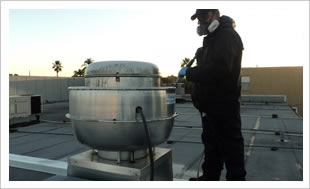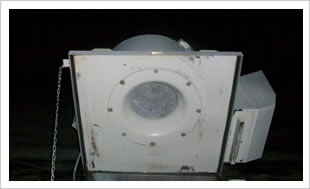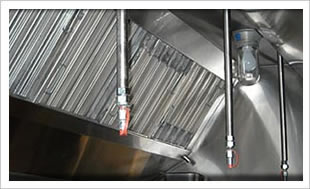Frequently Asked Questions
Hood Master Service technicians are trained and qualified to access and remove oil vapor deposits from your hood system. Hood Master Service crew will remove the grease-laden deposits from hood, filters, fan, grease cups, grease traps and duct work. Hood Master Service will leave your hood system clean and safe. We take pride in our work! Give Hood Master Service a try, we feel confident that you will be very satisfied with our services.
Question:
I think my kitchen staff can do the cleaning – why should I use Hood Master Service?
Answer:
Hood Master Service staff is insured and certified for the professional cleaning of hood systems. Our team will access all the parts of your hood system from the filters in the kitchen to the fan on the top of the roof. Moreover, the law requires that the cleaning be completed by professionals who are qualified to remove oil vapors and handle the professional chemicals and equipment (NFPA 2011)
Question:
Why do we need to clean the whole hood system – shouldn’t the cleaning of the filters be good enough?
Answer:
|
|
Superficial cleaning of the filters will not get rid of the oil-vapors located throughout the whole hood system. Oil vapors can be harmful in numerous ways. First, accumulation of the grease in the hood system is a fire hazard. Under high temperatures accumulated oil can evaporate and combust (Ackland 2012). Second, dirty oil build-up is unhygienic. Third, oil-vapor can cause damage to the environment through spill and during higher smoke release. Therefore, government agencies require professional cleaning in order to keep restaurant safe, sanitary, and environmentally friendly.
Question:
What parts of my hood system are going to be cleaned?
Answer:
Hood Master Service will clean hood, filters, fan, grease cups, grease traps and duct work. In order to clean these parts, our team will use chemicals and follow with the pressure steam wash. After the cleaning is complete, your hood system will be left oil-free.
Question:
What should I look for when hiring a company?
Answer:
Hood Master Service is insured and certified. Our team members are trained to detect and clean oil vapor build up and handle the professional exhaust system cleaning equipment. We are currently a member of National Fire Protection Association.
Question:
How often does my system need to be cleaned?
Answer:
The number of times the hood system needs to be cleaned depends on several factors. Primarily, it is related to the restaurant’s operations volume - that is how frequently the food is cooked. Subsequently, scheduling cleaning timetable considers the type of the oil deposit. For instance, oil deposits differ based on the cooking techniques such as deep frying or cooking. Moreover, various foods (starches, meats, sugars) can influence the type and volume of the grease deposit (Ackland 2012). All of these factors are considered when Hood Master Service commends cleaning frequency. Due to above mentioned aspects of restaurant operation, Hood Master Service schedules cleaning one time a year, twice a year, or every four, three, two months. Some high volume operations require monthly cleaning.
Question:
Why Choose Hood Master Service?
Answer:
While before you had to hire uninsured contractors who would clean only filters, now you can rely on Hood Master Service expertise and experience. We will provide you with superior service that will include cleaning of all the parts of your hood system.
Hood Master Service will inspect your system prior to the cleaning, cover the kitchen equipment before the cleaning, and take pictures of your hood system before and after cleaning. In addition, upon request, Hood Master Service provides you with a field report.
Hood Master Service will inspect your system prior to the cleaning, cover the kitchen equipment before the cleaning, and take pictures of your hood system before and after cleaning. In addition, upon request, Hood Master Service provides you with a field report.
| NFPA #96 Fire Codes: | |
|---|---|
| Type or Volume of Cooking | Inspection Frequency |
| Systems serving solid fuel cooking operations |
Monthly |
| Systems serving high-volume cooking operations, such as, 24-hour cooking, charbroiling, or wok cooking |
Quarterly |
| Systems serving low-volume cooking operations |
Semiannually |
| Systems serving low-volume cooking operations, such as churches, day camps, seasonal businesses, or senior centers. |
Annually |







